- 当前位置:
- 首页>
- 活动>
- ���������������
���������������
CCG持续关注国际关系议题,推动中国与全球化的发展,积极开展国际交流,充分发挥智库“二轨外交”作用,在巴黎和平论坛、达沃斯世界经济论坛、慕尼黑安全会议等重要国际政策与意见交流平台上组织分论坛、边会、圆桌会议、晚宴等活动,促进国际政商学界对话,凝聚共识;CCG积极与各国政界、智库界、工商界开展“二轨外交”活动,每年常态化赴多国调研与交流,促进中外关系攸关方互动,保持与多国政策圈层的沟通渠道。
-

环球时报:中国有意建特色智库 令其不可避免向西方开放
中国拥有世界第二多(426个)的智库,仅次于美国(1826个)。近日中国领导人号召建设新型智库,且应具有“中国特色”,以促进现代化和治理体系并增强中国的软实力。 尽管数量不断增加,研究范围也逐步扩大,相比西方同行,中国的智库往往被认为缺乏全球影响力。西方普遍认为中国的智库受到意识形态控制。但近几个月来,中国分析家和官员讨论了未来智库发展之路。在中国,智库的力量能否扩大,取决于北京领导层是否愿意让其打造公信力,代表一个快速成为世界事务主角的国家讲话。 目前,智库在中国是代表决策的重要缩影和实验室。领导人发表讲话后,学术界和大学研究机构被要求遵循融入新“中国特色”的方针。今年2月中国教育部下发《中国特色新型高校智库建设推进计划》的文件,4月中国与全球化智库举办首届“智库与中国发展”研讨会,意在分享(国际)管理经验和加强智库合作。这表明,北京有意将本国智库打造成能与西方智库匹敌的机构。 大学研究机构并非是唯一进行重组的,研究国际关系的官方和半官方机构也会发挥更大作用。目前很难说,这会在何种程度上改善中国外交的工作机制或者此类改革是否会制约智库独立性。一方面,改革会创新中国智库体系,令其不可避免向西方开放。另一方面,对研究领域严格划分的趋势——如政府分配研究课题,可能影响中国智库的研究质量,特别是长远而言。 发展智库应放在中国在全球事务中作用越来越大的背景下看。中国智库常被低估,其中一些因研究成果质量不高而背上不良名声——特别是与西方同行相比。中国的智库必须具有竞争力以支持中国面临的众多全球挑战。
2015年1月6日 -
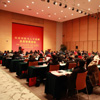
中国社会科学网:“科技创新与人才战略”高层智库论坛在上海举行
2014年12月20日,我院与中国浦东干部学院、上海市委党校、光明日报社联合举办的“科技创新与人才战略”——高层智库论坛(2014)在中国浦东干部学院举行。中国浦东干部学院副院长王金定、光明日报社副总编辑李春林、上海社会科学院副院长黄仁伟、中共上海市委党校副校长郭庆松分别代表主办单位向论坛致辞,表达了对智库建设的高度重视和对依靠高素质人才建设创新型国家的信心与期待。 与会专家围绕“科技创新和人才培养”、“智库建设与发展”两个议题从不同角度发表了主旨演讲并作了深入探讨。国务院发展研究中心宏观经济研究部副部长魏加宁讲述了自己对于智库的思考,指出智库本身应该具有超前性,创新性、独立性和客观性,智库的生命力在于质量;北京市中关村科技园区管委会副主任杨建华结合中关村经验,介绍了如何帮助科技人员释放活力、创新创业;中国人才研究会常务副会长吴江阐述了创新驱动发展面临的人才挑战。 来自国务院发展研究中心、国家行政学院、中关村管理委员会、中国人事科学院、中国与全球化智库、上海市政协等单位及四家主办单位的百余位专家学者参加了论坛。
2015年1月6日 -
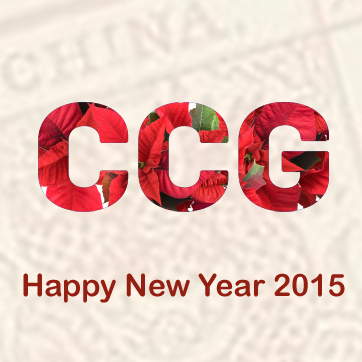
致中国与全球化智库(CCG)的朋友们!
尊敬的CCG朋友: 崭新的2015年已经开始,值此辞旧迎新之际,CCG向您致以最美好的祝愿! 2014年,在您的大力支持和积极参与下,CCG秉持“国际化、影响力、建设性”的原则,以全球视野为中国建言,以世界眼光为中国献策,获得了里程碑式的进展,在此我们邀您一起分享这份荣光。 2014年,CCG已成长为国内领先的国际化智库。除了总部北京,在广州、青岛、东莞、香港设立了研究院,在纽约、华盛顿、法兰克福、巴黎、悉尼设置了海外代表处,已经形成国际化的研究网络和拥有60余名全职研究和工作人员的精干团队; 2014年,CCG建言献策工作卓有成效,提交《建言献策参考》40余篇,10余篇被有关部委采用,3篇获得中央有关领导批示; 2014年,CCG在社科院社科文献出版社发布4部蓝皮书,其中有关研究还荣获皮书出版二等奖;承接人社部、中组部等中央部委和国家社科基金委托的重大研究课题6项,首次发布《中国企业国际化报告》蓝皮书、《海外华侨华人专业人士报告》蓝皮书; 2014年,CCG的专业研究水平再次受到政府重视和肯定,被中组部授牌为“中央人才工作协调小组办公室人才理论研究基地”; 2014年,CCG举办活动20余场,成功组织“2014中国留学人员创新创业论坛”和“首届中国企业国际化论坛”;与多家国际智库如世界移民组织、亚洲协会、美国对外关系委员会、美国企业研究所、兰德公司、宾夕法尼亚大学智库研究中心、香港经纶研究院等合作举办多场国际研讨会,出席世界移民大会、世界教育峰会发表主旨演讲,在哈佛大学发表“中国智库迎来春天”主题演讲;与东方卫视联合推出国内首部大型海归题材纪录片《海归中国》(15集); 2014年,CCG成功召开年度高层工作会议,咨询委员会主席龙永图、联席主席陈启宗和副主席及常务理事出席会议,为CCG工作出谋划策; 2014年,CCG出版专著10部,出刊月度杂志12期;与人民出版社合作出版国内首部对中外知名智库进行全面比较研究的著作《大国智库》; 2014年,CCG百度搜索量已近700万;研究成果获得数百家国内外主流媒体报道和数千次转载;CCG中英文网站和7个公共微信平台,向中外高端受众及时传递CCG的声音; 2014年,CCG的政策影响力、国际影响力、社会影响力不断攀升,我们对您在其中给予的鼎力支持表示真诚感谢。2015年,CCG希望与您继续携手,为打造国际一流智库而共同努力。 最后,CCG恭祝您2015新年快乐,万事胜意!中国与全球化智库(CCG)恭贺 2014年岁末Seasons Greetings from CCG Dear Friends,At this special moment, we would like to express our deep and sincere appreciation for your important contribution to CCG all through 2014 and wish you a happy new year and the best for 2015.This past year has been a highly successful one for CCG. Thanks to your great participation and support, CCG has made significant progress over the past 12 months. We remain dedicated to the goal of establishing CCG as a leading independent think tank in China with a strong global presence and influence that strives to promote the globalization of Chinese talent and enterprises. Our overriding objective is to offer high quality research and strategic advice in order to help Chinese policymakers enact better policies domestically and globally. We are quite honored to have you as our partners in fulfilling this vision.In 2014, CCG experienced substantial growth, bringing it much closer to its goals of becoming a leading independent and international think tank in China. This year, we inaugurated the North China Global Talent and Dongguan Talent Institutes, which will both play a key role in analyzing and providing policy advice on how China can attract the highest quality talent in the request to remake its economy. CCG now also has branches in nine cities-Beijing, Guangzhou, Qingdao, Dongguan, Hong Kong, New York, Washington, Frankfurt and Paris. We have built up an extensive international institutional network, boasting an extended but streamlined organizational structure and highly efficient team with over more 60 full-time researchers and staff.In 2014, CCG provided more than 40 Policy Recommendations and Memos for the Chinese Central Government, 10 of which were adopted by the Ministries concerned, with three providing guidance for top-level leaders on specific key issues. This success underscores CCG’s increasingly deep and visible footprint in influencing and shaping policy-making in China.In 2014, CCG released four Blue Books, while undertaking six important research projects for the Ministry of Human Resources and Social Security, the Organization Department of the Central Committee of the CPC, and National Planning Office of Philosophy and Social Science. CCG also put out two new Blue Books, Report on Globalization of Chinese Enterprises 2014 and Report on Overseas Chinese Professionals 2014, which are the first in-depth studies of these two important issues undertaken by a China-based think-tank.In late May of 2014, the Organization Department of the Central Committee of the CPC recognized CCG as a "Base of Global Talent Research." In so doing, it acknowledged both CCG’s expertise in this issue and the valuable advice it has given to the Chinese Central Government in helping to shape human resource and talent development policies.In 2014, CCG put on more than 20 activities, organizing "The 9th Forum on Chinese Overseas Returnees Innovation and Entrepreneurship" and "Inaugural Meeting of China Outbound Forum." CCG cooperated with a number of highly regarded international think tanks to hold international seminars. These included the International Organization for Migration (IOM), International Metropolis, Asia Society, U.S. Council on Foreign Relations, American Enterprise Institute, Rand Corporation, University of Pennsylvania Think Tank Research Center, and Hong Kong Fung Global Institute. CCG wrote and its leaders gave keynote speeches at the International Migration Conference and World Education Summit. CCG also delivered an address entitled "The Coming Spring of Chinese Think Tanks" at a conference held at Harvard University. Moreover, CCG produced and presented, in cooperation with Shanghai-based Dragon TV, the first large-scale documentary on overseas Chinese coming back to their mother country, Chinese Returnees in Contemporary China(15 episodes). All of these activities clearly show that CCG is creating a high profile for itself both in and outside of China, strengthening its status as the most prestigious and leading think tank in the Chinese talent and enterprise globalization.In 2014, CCG successfully held its annual top executive working conference. This year’s gathering involved the Chairman of the Consultative Committee, Long Yongtu, Co-Chairman Ronnie Chan, and vice-chairmen and standing directors, who offered constructive suggestions to CCG.In 2014, CCG published ten treatises, twelve monthly journals and the book entitled Global Think Tanks. The latter is the first book in China providing comparative research and study on Chinese and well-known foreign think tanks. The volume has been published by the People’s Publishing House.In 2014, CCG received more than seven million search results on China’s leading internet search engine, Baidu. Our research achievements have been covered by more than 100 mainstream media outlets both in China and abroad, with the latter including The New York Times, Wall Street Journal, Financial Times, Reuters, and The South China Morning Post. Hundreds of individual stories were written about the organization over the past year. CCG transmits its influence to high-end audiences through a very informative website which is in both Chinese and English and seven WeChat platforms.In 2014, CCG gained an increasing national influence and international prestige. We would like to express our sincere appreciation for your support, which has helped make all of that possible. We hope that by continuing to work hard together, we can keep CCG on the fast track to becoming a first-class global think-tank. Thank you!Best Regards,Sincerely,Center for China and Globalization1st January 2015
2015年1月5日 -
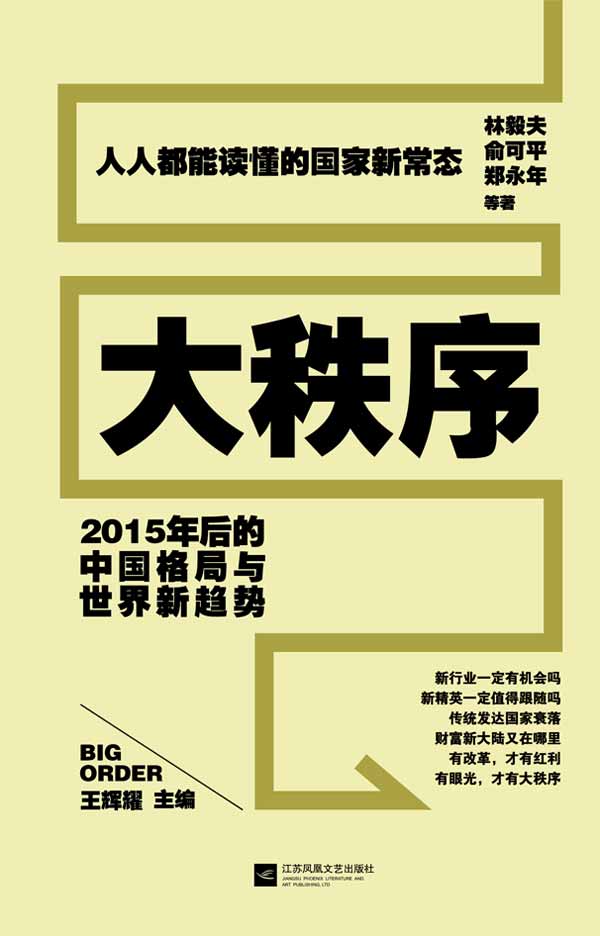
Global Times: ‘Worst reform is no reform’ when China’s economic future at stake
Wang Huiyao, Big Order, Jiangsu Phoenix Literature and Art Publishing Ltd, November 2014China has driven global growth for years. However, opinions are widely divided as to whether such trend can be maintained in future.How to allocate the new dividends brought by reforms? How to hedge existing wealth against the inflow of hot money? How long can the traditional industries survive and what will happen to the emerging industries? These are all doubts about China’s economy, and they can be summarized into one question: Given the current gradual reforms, where is China’s economy heading?This is not a new question. Dozens of books have been published on this topic in recent years, written by both Chinese and foreign authors. There are lots of debates on this topic, and it’s difficult to get a consensus. In such a case, the viewpoints of top experts offer a sold reference point.The Center for China & Globalization, an independent think-tank based in Beijing, invited some experts to comment on various aspects of the development of China’s economy, and compiled them into a book titled Big Order.Contributors to this book include Justin Yifu Lin, former chief economist and senior vice president of the World Bank, Yu Keping, deputy director of Central Compilation and Translation Bureau, Zheng Yongnian, professor and director of East Asian Institute at National University of Singapore and others. It was published by Jiangsu Phoenix Literature and Art Publishing Ltd in November.In the book, contributors all agree that China has made great progresses through reforms. Yu says that Chinese society has undergone profound changes and formed three subsystems: a political society represented by the Party and the officials, an economic society based on business organizations and a civil society formed by civil and social organizations.They also believe that reforms continue in spite of the problems. Zheng holds that the biggest risk in China’s reforms is no reform. Many risks ahead of China, shadow banks, local debts, and the real estate bubble, are all the outcomes of a lack of reforms in related areas.Lin further argues that China not only needs to continue the reforms, but has to carry out them from the roots. The reforms in economic fields should be market-oriented, so as to eliminate negative factors in economic development and create a fairer environment.Reforms are a hard process with turns and twists in all the countries. Although the blurb says that this book talks about "elites’ prediction on the future of China’s economic development," contributors of this book do not lay out a clear blueprint of China’s economy in the future but just offer assessments and suggestions based on existing problems and present-day situation.Given that China’s reforms are still in progress, perhaps it is too early to make a conclusion. At least, according to these experts, reforms are bringing Chinese economy toward a better tomorrow. That’s enough.
2014年12月29日 -
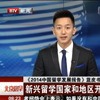
【BTV新闻频道】北京您早:《2014中国留学发展报告》蓝皮书日前在北京发布
2014年12月24日 -

【CCTV中文国际频道】中国新闻:《2014中国留学发展报告》:新兴留学国家和地区出现
2014年12月24日 -
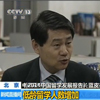
【CCTV新闻频道】新闻直播间:《2014中国留学发展报告》蓝皮书发布 新兴留学国家和地区出现
2014年12月24日